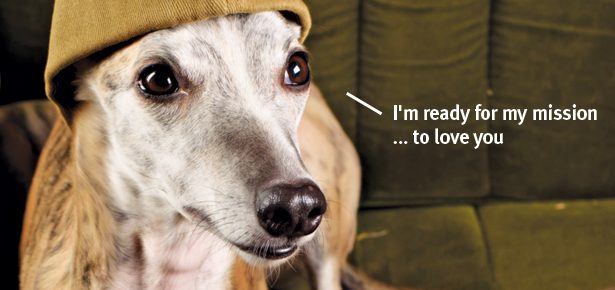
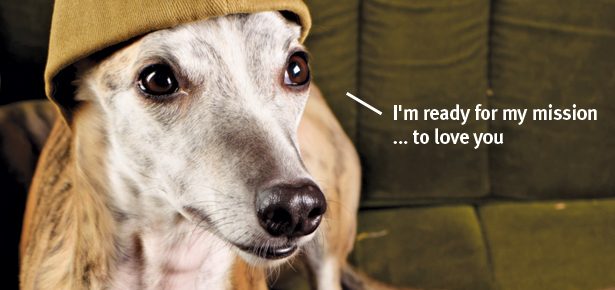
This Amazing Organization is Saving the Lives of War Veterans AND Shelter Dogs
It’s not only a match made in heaven; it’s a recipe for success
After her son returned from his second tour in Iraq, Shari Duval of Ponte Vedra, Florida came face-to-face with the devastating reality of post-traumatic stress disorder (PTSD).
“My son, who is a veteran K9 police officer, worked as a bomb-dog handler for the U.S. army and returned with severe PTSD,” she says. “He looked the same, he’d lost some weight—but it was like the lights were on with nobody home. He was just a shell inside; he had lost all emotion, he was quiet … and then he began isolating. We couldn’t get him out of the house. He started drinking—and this was a kid who never drank. I honestly didn’t know what to do for him.”
Seeking a way to alleviate some of her son’s suffering by drawing on his love for and background working with dogs, Duval embarked on two years of research into canine assistance for PTSD, eventually concluding that the best way to help her son—and others like him—was to start a non-profit organization that would train and give service canines to warriors in order to help them return to civilian life with dignity and independence.
2010 saw Duval’s dream come to fruition with the birth of K9s For Warriors. Within the year, her organization had achieved non-profit status.
“We’re dedicated to providing service canines to our warriors suffering from PTSD and/or traumatic brain injury … as a result of military service post 9/11,” Duval explains. “Our goal is to give ‘a new leash on life’ to rescue dogs and military heroes.”
The “rescue dog” aspect is an important one—at first, Duval believed she’d need to raise and train purebred dogs in order to do this important work. But she soon came to the conclusion that there were “too many excellent, beautiful dogs in shelters that need good homes” and that, with help from a team of trainers and evaluators, “we could save some of these dogs’ lives while simultaneously tackling the issue of PTSD.”
Today, K9s For Warriors’ roster of dogs is gleaned almost exclusively from shelters across the U.S. Most of the animals, says Duval, are Labrador Retriever or Golden Retriever mixes—unfortunately, the organization’s insurance coverage prohibits it from including “bully breed” dogs.
Beyond breed, Duval says, “Not all dogs are capable of working. They need to have the right personality and temperament—we’re looking for smart, even-keeled animals who are relatively low maintenance and eager to learn.”
Size, too, matters, and retrievers are ideal in that many of the warriors in the program have mobility issues and wouldn’t do well with a smaller dog.
“We only accept dogs under two years of age and, once they’re pulled or donated, we have them medically checked by our own vet for any potential issues like hip dysplasia,” Duval explains. “The last thing we want is to give a veteran a dog and have it come down with a problem that would prohibit it from working.”
The dogs are then kept under evaluation for 30 days to “see how they get along with other dogs, people, children, noises, cars, public places … the entire process lasts between 30 and 40 days before a dog is accepted into the program.”
And what becomes of an animal that falls short? Happily, K9s For Warriors has never been forced to return an animal to a shelter. Rather, dogs deemed “not fit” to be service animals are placed as pets with loving families.
“It’s about a 10 percent wash-out rate,” says Duval. “But we’re really proud of the fact that, of [the near] 200 dogs we’ve matched with warriors to date, we’ve only made two mistakes where the pair just didn’t bond.”
That’s because, as thorough as K9s is about choosing the right animals to enter its program, the application process for people is just as thorough, to ensure the wellbeing and success of everyone involved.
“We conduct many, many conversations with them—we even go so far as to have them submit pictures and videos of their home environment, so that we can take into account whether they live in an apartment or house, have a yard, have children or other pets,” she says. “We determine how mobile each warrior is, as well as what they like to do. If a veteran likes to go kayaking or hiking, we want to make sure we pair him with a dog that can do these activities.”
Duval stresses the fact, however, that “these are service dogs trained with specific skills—they’re not therapy or companion dogs. Some are taught to pick things up, others learn retrieval or how to open and close doors. A common issue associated with veterans with PTSD is a strong dislike of being approached from the front or back; it really puts them on guard. Our dogs are taught to cover in the back and block in front, to alleviate this.”
One inherent skill that, she says, a large portion of dogs in the program seem to instinctively possess (that is, it’s not a taught behaviour), is “waking their warriors up from horrific nightmares and flashbacks. The dogs will lick their faces or pull on them to bring them back to reality—that just comes from the bond of being with them.”
Considering the commonly cited statistic that 22 veterans a day are lost to suicide, Duval says the biggest overall benefit of the K9s For Warriors program is, “We’re saving their lives. These dogs are saving lives. The dogs take the place of medication, and give veterans a reason to stop isolating themselves, to get out there and to live.”
Following are the stories of three real-life K9s For Warriors “graduates” and their incredible dogs:
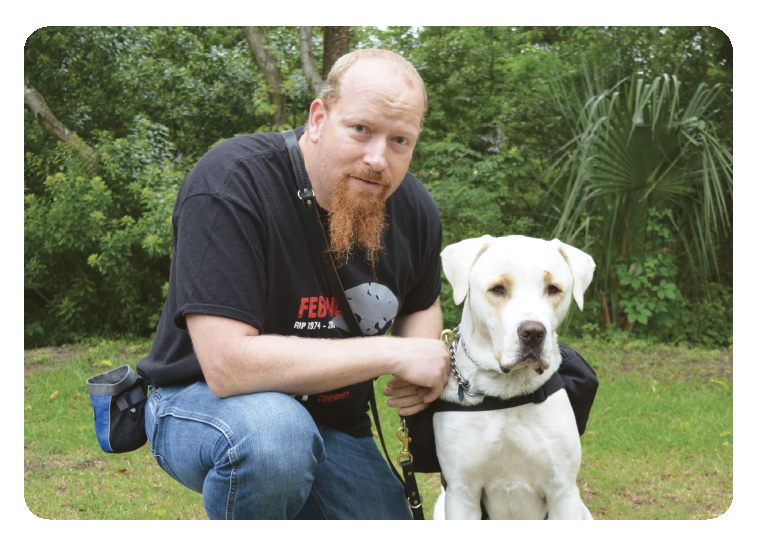
Following his eighth involvement with an IED (improvised explosive device), Greg returned home to Missouri in 2012.
“I came back to the U.S. a veteran with PTSD and a traumatic brain injury,” he says. “I started medical treatment immediately.”
His friends and family, however, felt something else could be done to help Greg rehabilitate. After spotting K9s For Warriors on social media, his wife, along with a close friend, suggested he apply to the program. Several weeks later he received his letter of acceptance from Duval and her team.
“I can’t stand taking meds and I was definitely looking for a way to mitigate the amount I needed to take,” he says. “The possibility of being able to do that through this program, I have to admit, was pretty attractive.”
Greg’s “training” proceeded like all other participants in the K9s program.
“I went down to the facility in April, to start my stay,” he says. “I was in a group with five other guys. We came in on a Sunday, had orientation, and the next day was ‘dog day,’ when we all got to meet our dogs.”
When Greg was introduced to Jackson, it was “nearly” love at first sight.
“They brought this big Lab-Mastiff mix out and my immediate thought was, ‘I asked for a dog, not a horse!’ But then I learned more about him—he was a rescue out of North Carolina—and I knew they’d made a good match.”
After completing three weeks of training, including basic commands and working with the dog in public, Greg and Jackson headed home.
“Jackson has been a godsend,” he says. “Things are different now—I can get out of the house, I can be more open, I don’t have to worry about whether or not someone has my back. Jackson’s whole job is to make me happy. I can’t say enough good things about him.”
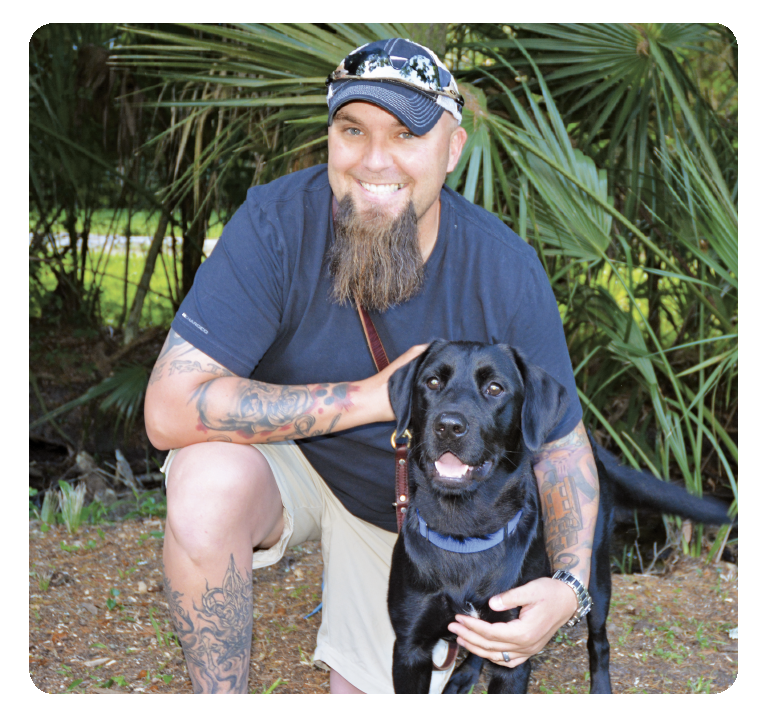
A war veteran living in southwest Louisiana and suffering from PTSD, Erick was on a daily regime of various powerful medications when his doctor asked him if he’d ever considered getting a service dog.
“He actually wrote me a prescription for it,” Erick says, adding that he’s always had a love for dogs and had worked with them in the military.
An Internet search, however, yielded a dizzying number of results, and saw Erick contact “at least 20 different orgs, searching for a dog.” Finally, he connected with K9s For Warriors—and knew he’d found the right place.
“They seemed very down to earth, knowledgeable,” he recalls. “I asked about certifications; everything checked out. I liked the fact that there was a training period and process, where the dog was with you 24-7, and trainers and staff would be there, too.”
When Erick arrived at the K9s facility in Florida, he was nervous—going to new places and meeting new people wasn’t easy for him. The staff and volunteers, however, put him at
ease, and he looked forward to the next day, when he would meet his dog.
“I had no expectations about breed or anything like that, I was just thrilled about everything they were doing for me,” he says, adding that his wife and daughters did, however, tease him about the possibility of getting paired with a “purse dog.”
Fortunately, his canine match turned out to be a black Lab, Gumbo, who’d been sponsored and named by New Orleans Saints coach Sean Payton. (All dogs are entirely free to veterans, but supporters are encouraged to sponsor a dog for a warrior.)
“Sean Payton donated the money for K9s to be able to provide someone with a service dog, and for that contribution he got to give Gumbo his name,” Erick says. “He actually followed right through with the Louisiana theme and specifically wanted Gumbo to go to a Louisiana veteran. That lucky person was me, and I got to meet Sean and go to some Saints games.”
As for Gumbo, who was rescued from a shelter in North Carolina, Erick says that, even after training was over and he and his dog went home, the rapport between them continued to build.
“The friendship—that bond—it gets stronger every day,” he says. “There are so many positives to me having this dog. I suffer from short-term memory loss, and Gumbo, not purposely, but in general, tends to remind me of things. He takes my mind off some of my anxieties, makes me feel more comfortable going into stores. He just alleviates me worrying about the ‘real world;’ I’m more worried about him.”
It may not sound like a lot but, in Erick’s own words, “It’s a huge help.”
“You have to put a lot of work into having a service dog like Gumbo, but the payoff is huge,” he says. “And K9s For Warriors—they’re doing a double good deed, far as I’m concerned, by saving these shelter dogs’ lives and helping out veterans like me impacted by PTSD. It’s giving everyone a second chance.”
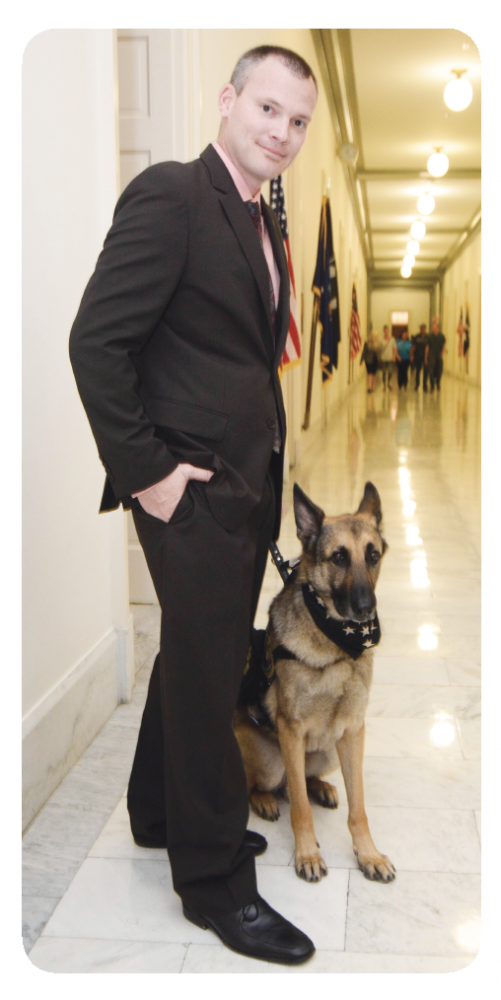
When he returned to Fredericksburg, Virginia, after three tours of duty in Afghanistan, Jason was in a “really dark place.”
“I hadn’t been diagnosed with PTSD yet, but I did suffer from a traumatic brain injury,” says the veteran, admitting that, despite trying “every medical treatment you can think of,” he felt completely shut off from family and friends.
“I tried dozens of types of meds, talk therapy, acupuncture, you name it,” he says. “Eventually I was diagnosed with PTSD.”
After his wife issued him an ultimatum, Jason searched the Internet for service dogs, which he’d heard could help veterans with his condition. While other organizations had long waiting lists, K9s For Warriors promised him a dog within seven or eight months—and kept in close touch during that time.
“I could see a light at the end of the tunnel,” he says. “Help was on the way.”
Traveling to K9s’ headquarters in Florida with “an open mind,” Jason met his sable-coloured German Shepherd, Axel, on a Sunday—and this year celebrated his third anniversary with
his dog.
“Very soon after getting Axel, I knew everything was going to be OK,” he says, adding that his dog, who was pulled from a high-kill shelter just two days before he was set to be euthanized, helps manage his nightmares and memory loss. Best of all, Axel was nominated for this year’s American Humane Association’s Hero Dog Award—an honour Jason says provides a platform for reaching other veterans suffering from PTSD.
“I’ll keep telling mine and Axel’s story until I’m blue in the face,” he says. “This program, this dog—they’ve saved my life.”
Join the newsletter and never miss out on dog content again!
"*" indicates required fields
By clicking the arrow, you agree to our web Terms of Use and Privacy & Cookie Policy. Easy unsubscribe links are provided in every email.